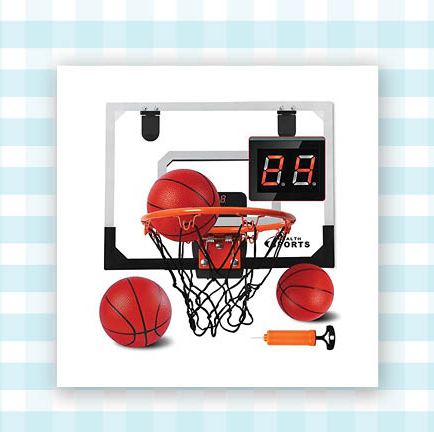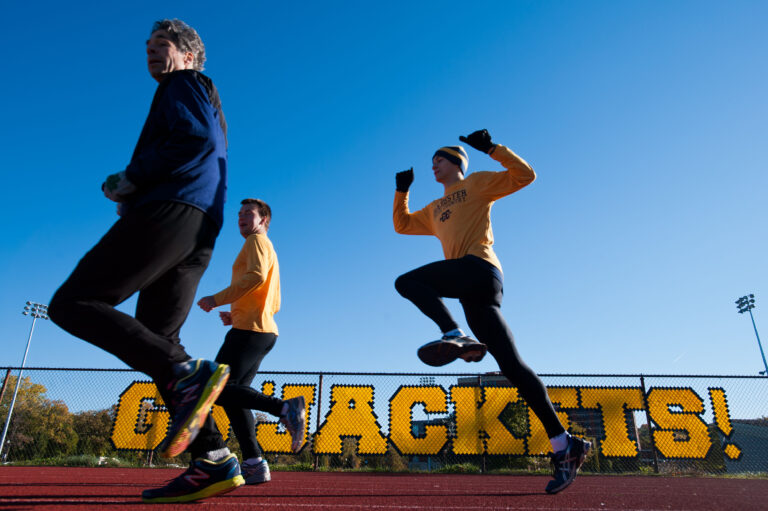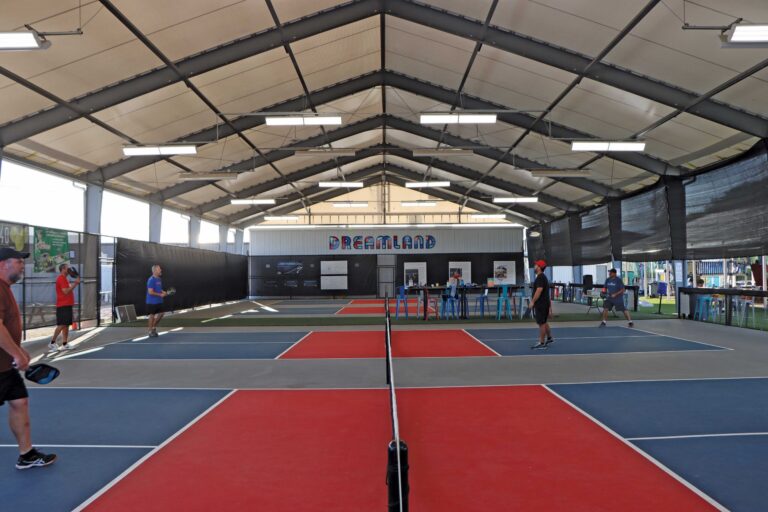Sports that require teamwork include soccer, basketball, volleyball, hockey, and rugby. In these sports, players work together to achieve a common goal, relying on effective communication and coordination.
Teamwork is crucial in these sports as it enhances the overall performance of the team, leading to better strategies, decision-making, and success in competitions. Cooperation, trust, and support among teammates are vital components of these sports, promoting unity and bonding.
The ability to work well as a team, understanding each other’s strengths and weaknesses, and implementing effective strategies are key factors in achieving victory. These sports teach valuable life skills such as collaboration, leadership, and perseverance, making them popular choices among athletes of all ages.
Read Also:
- Sports That Require a Helmet: Thrilling Activities for Safety-Conscious Athletes
- Sports That Require Protective Gear: Play Fearlessly with Essential Equipment!
Sports That Promote Teamwork
Teamwork is an essential aspect of many sports, as it requires individuals to come together and work towards a common goal. These sports emphasize coordination, communication, trust, and cooperation, creating the perfect environment to learn the value of teamwork.
Whether it’s strategizing on the field, passing the ball, or supporting each other, these sports help build strong bonds among teammates. In this blog post, we will explore three sports that not only demand individual skills but also emphasize the power of working together as a team: football, basketball, and volleyball.
Football
Football, also known as soccer in some countries, is a sport that symbolizes the essence of teamwork. With eleven players on each side, this game requires precise coordination and communication among teammates to achieve success.
The field is divided into different positions, each serving a specific role, making it essential for players to work together seamlessly. Here are a few aspects of football that promote teamwork:
- Passing and Assisting: One of the key aspects of football is passing the ball effectively. Players need to communicate through verbal cues, eye contact, and even body language to decide on the best strategy to attack the opponent’s goal. Quick, accurate passes help create scoring opportunities, highlighting the importance of collaboration.
- Defensive Support: A solid defense is crucial in football, and teamwork plays a significant role in achieving this. Defenders need to trust each other, communicate, and work in harmony to deny the opposing team chances to score. A well-coordinated defense can make it difficult for the opposition to penetrate, leading to successful outcomes.
- Set Pieces: Football teams often practice set pieces, such as corner kicks or free kicks. These require strategic coordination, as players must move synchronously to maximize scoring opportunities. Effective teamwork can lead to successful set plays and contribute to the team’s overall success.
Basketball
Basketball is another team sport that requires excellent teamwork skills. With five players on each team, this fast-paced game demands efficient coordination and communication. Teamwork is crucial in basketball for the following reasons:
- Passing and Movement: Basketball teams rely on quick passing and constant movement to create scoring opportunities. Teammates must anticipate each other’s actions and communicate effectively to maintain fluidity on the court. The synergy between players enables effective offensive plays.
- Defensive Strategies: Similar to football, basketball requires coordinated defensive strategies to prevent the opposing team from scoring. Communication, trust, and coordination are essential in executing zone defenses, trapping techniques, and switches. Successful defensive plays ultimately depend on the collective effort of the team.
- Rebounding: Rebounding, both offensive and defensive, is a critical aspect of basketball. Securing rebounds requires teamwork, as players need to box out opponents and position themselves strategically. Effective teamwork in rebounding can lead to second-chance points or limit the opposition’s scoring opportunities.
Volleyball
Volleyball is a sport that epitomizes collaboration and communication. With six players on each side, this game combines individual skills with the need for precision teamwork. Here’s how volleyball promotes teamwork:
- Setting and Spiking: Volleyball teams rely on a strong setter-hitter connection to create successful attacks. The setter must accurately position the ball, while the hitter must trust the setter’s judgment and time their jump correctly. Effective communication and understanding of each other’s abilities are crucial in successfully executing offensive plays.
- Passing and Digging: Passing and digging are essential skills in volleyball, emphasizing teamwork. Players need to communicate to determine who will receive the serve or dig an opponent’s attack effectively. Together, they create a defensive wall and keep the ball in play, setting up subsequent plays for the team.
- Serve Receive: Volleyball teams must work as a unit to receive serves successfully. Players need to position themselves strategically and communicate to ensure efficient ball distribution. A well-coordinated serve receive helps the team maintain control and initiate offensive plays.
These three sports – football, basketball, and volleyball – showcase the importance of teamwork in achieving success. By combining individual skills with effective communication and collaboration, players learn to trust and rely on each other, ultimately strengthening their bond.
Whether it’s on the field, court, or sand, these sports provide valuable lessons in teamwork that extend far beyond the game.
Benefits Of Teamwork In Sports
Teamwork is an essential component of sports, and it offers several benefits that contribute to a team’s success. When athletes come together, their combined efforts propel them towards enhanced performance and success, building strong relationships and trust, as well as developing leadership and communication skills. Let’s delve deeper into these advantages:
Enhanced Performance And Success
Teamwork plays a vital role in enhancing the performance and success of any sports team. When athletes work together towards a common goal, they can achieve much more than they would as individuals. By combining their unique skill sets and abilities, they can strategize effectively, make better decisions, and execute game plans more efficiently.
This collaboration results in improved performance and increases the chances of achieving victory. Furthermore, through teamwork, athletes can evaluate their strengths and weaknesses and learn from each other, which ultimately leads to overall growth and success.
Building Strong Relationships And Trust
One significant benefit of teamwork in sports is the opportunity to build strong relationships and foster trust among teammates. When athletes work closely together, facing challenges, victories, and defeats as a unit, they form bonds that go beyond the playing field.
This emotional connection creates a supportive and encouraging environment, where teammates can rely on each other for motivation and inspiration. Trust is developed through the process of relying on teammates to fulfill their roles and responsibilities.
This trust is crucial in high-pressure situations, as it allows athletes to take calculated risks, knowing that their teammates will be there to support them. The camaraderie formed through teamwork not only enhances team dynamics but also promotes a sense of belonging and unity among the athletes.
Development Of Leadership And Communication Skills
Teamwork in sports provides an ideal platform for the development of leadership and communication skills. Each athlete brings their unique strengths and perspectives to the team, allowing for effective leadership to emerge based on these individual qualities.
Through collaboration, athletes learn how to lead and follow, understanding that leadership is not limited to a single person. They learn to communicate effectively, whether it’s on the field, during game plans, or off the court, when resolving conflicts and making decisions as a team. These skills go beyond the sports arena and are transferable to other aspects of life, such as academics, careers, and personal relationships.
In conclusion, teamwork in sports offers numerous benefits that contribute to a team’s enhanced performance, success, and overall growth. Through collaboration, athletes experience improved performance, build strong relationships, foster trust, and develop essential leadership and communication skills. By recognizing the value of teamwork, athletes can unlock their true potential and achieve remarkable results.
Frequently Asked Questions On Sports That Require Teamwork
What Sports Require The Most Teamwork?
Sports like basketball, soccer, and rugby require the most teamwork. These sports rely on coordinated actions, communication, and trust between teammates to achieve success. Effective teamwork is essential for players to work together towards a common goal and strategize their actions on the field or court.
How Does Teamwork Affect Sports Performance?
Teamwork plays a crucial role in sports performance. It enhances communication, coordination, and synergy among teammates, leading to better decision-making and execution of strategies. When players work together as a team, they can maximize their individual strengths and support each other’s weaknesses, ultimately improving overall performance on the field.
What Are The Benefits Of Participating In Team Sports?
Participating in team sports offers numerous benefits. It fosters social interaction, builds friendships, and teaches valuable life skills such as leadership, cooperation, and problem-solving. Team sports also promote physical fitness, enhance mental well-being, and teach individuals how to work collaboratively towards a common goal, both in sports and in life.
How Does Coaching Teamwork-Focused Sports Help Unlock Athletic Potential?
Coaching teamwork-focused sports fosters collaboration, discipline, and strategic thinking, enabling athletes to maximize their potential both individually and collectively. By focusing on these dynamics, coaches can inspire growth and resilience, making these some of the best sports to coach for unlocking skills that transcend the field and benefit every aspect of life.
Conclusion
Teamwork is the glue that holds sports together, enabling athletes to achieve greater success. Whether it’s basketball, soccer, or baseball, these sports are built on the foundation of cooperation, coordination, and communication. A strong team is capable of accomplishing remarkable feats, surpassing individual skills.
From strategizing plays to trusting teammates, teamwork not only fosters a sense of unity but also enhances performance. So, whether you’re a player or a spectator, the beauty of team sports lies in the collective effort and support that drives them forward.






